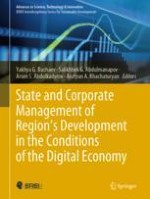This edited book presents scientific and practical recommendations for the successful state and corporate management of regional development under the conditions of the digital economy. These conditions have produced a number of changes. On the one hand, new aspects of regional economies, which require management, are emerging, above all, digital technologies that have to be understood by the population, employees in the labor market, and regional companies. On the other hand, new opportunities for improving practices in the state and corporate management of regional development on the basis of digital technologies are also emerging: e-government systems, digital marketing, online trade, “smart” regions, etc. This book provides an overview of the leading digital technologies and demonstrates how they can be used to improve modern practices in the state and corporate management of regional development in the digital economy. The authors develop the conceptual foundations and put forward practical recommendations. In closing, the authors’ conclusions and recommendations are applied to the example of modern Russia, ensuring the practical relevance of the research.
